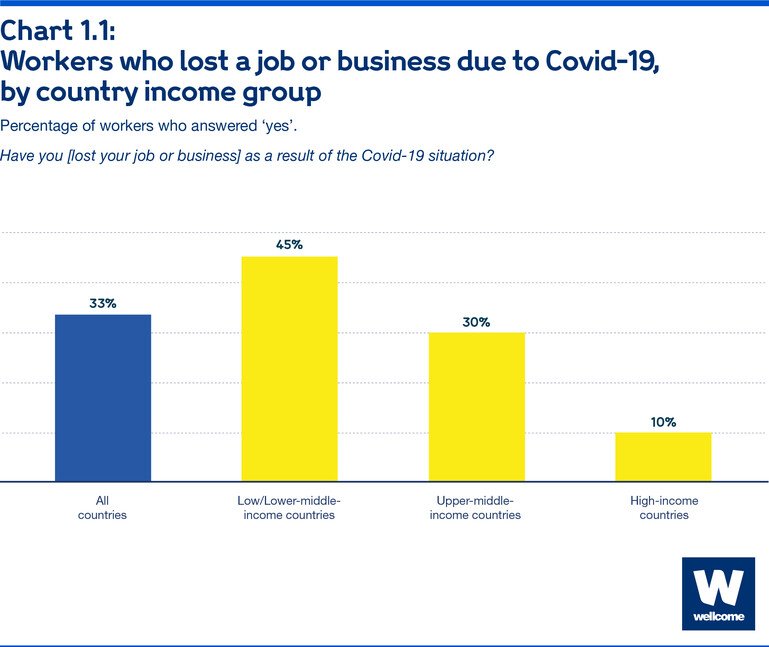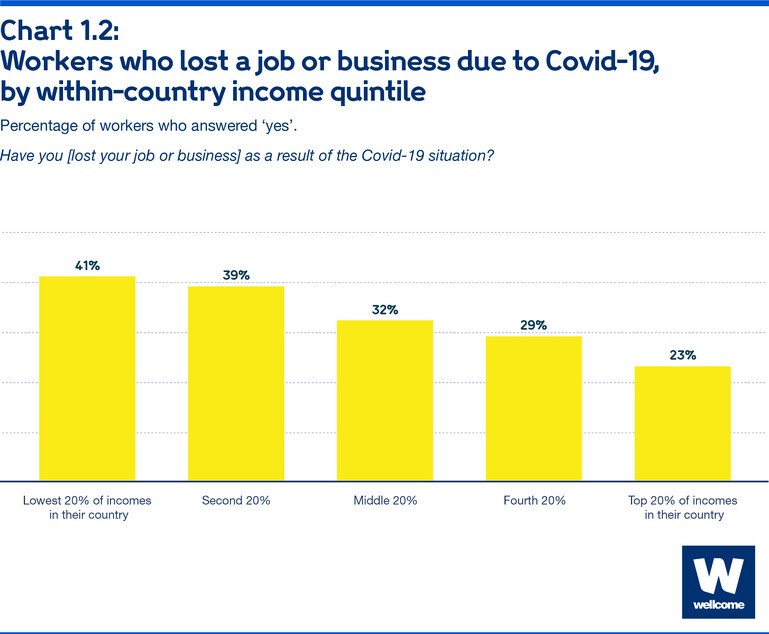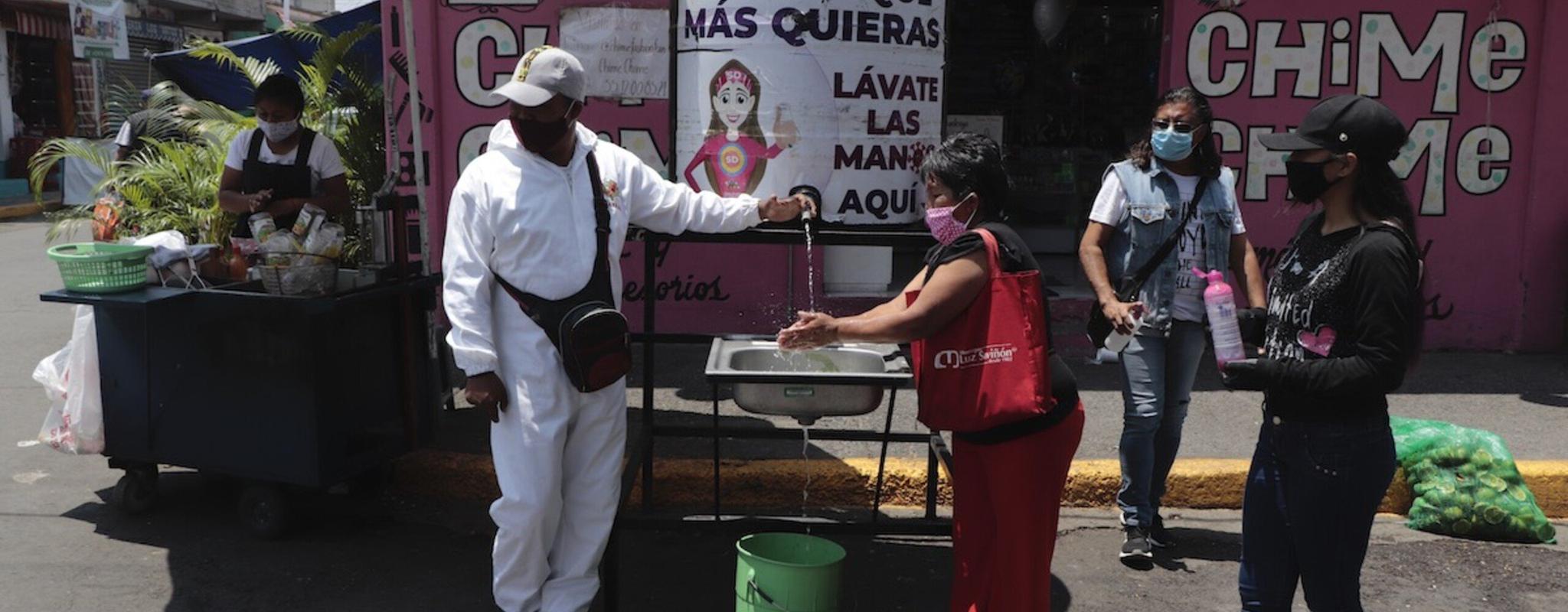Chapter 1: Covid-19's uneven impact around the world
This is the first chapter of the Wellcome Global Monitor 2020: Covid-19
The Covid-19 pandemic has created devastating public health and economic crises in most countries1. This chapter presents Gallup’s research on how broadly and severely the pandemic has impacted people’s lives around the world and explores Wellcome Global Monitor data on how this shared experience may have influenced global opinions on science and its role in managing and preventing such events. As previously stated, it is important to note that the virus’s spread and each country’s corresponding lockdown measures at the time of data collection probably influenced people’s responses about the pandemic’s effects; Appendix B includes information on such conditions in each country during the data collection period.
Four out of five people around the world said Covid-19 has affected their lives.
Eighty per cent of adults worldwide said that coronavirus has affected their lives to some extent, with nearly half (45%) saying it has affected their lives ‘a lot’ and a third (35%) saying it has affected their lives ‘some’. Fewer than one in five (19%) said it has not affected their lives at all. Countries where people were most likely to say their lives have not been affected were predominantly in three more rural regions: Sub-Saharan Africa, Southeast Asia and Central Asia. Further, in countries where people were most likely to say their lives have not been affected – including Laos (61%), Ivory Coast (44%), Tanzania (41%), Benin (40%) and Mali (38%) – Covid-19 caseloads were low and government restrictions (as measured by the Oxford Stringency Index2) were relatively light at the time of data collection (see the ‘Country dataset details’ table in Appendix B).
Covid-19’s economic impact was most severe in lower- and middle-income countries*.
Globally, one in three people who had jobs at the beginning of the pandemic (33%) said they lost their job or business because of the coronavirus situation (Chart 1.1), while about half said they had to stop working temporarily (53%), worked fewer hours (50%) or received less pay (53%) because of Covid-19.
Job losses were most common in low- and lower- middle-income countries, where economic activity is based less on knowledge work that can be done remotely3. Governments in these countries also had fewer resources to cushion Covid-19’s economic impact through fiscal spending – for example, by providing employers with subsidies to retain workers through necessary lockdown periods4.
Chart 1.1: Workers who lost a job or business due to Covid-19, by country income group
Percentage of workers who answered ‘yes’.
Have you [lost your job or business] as a result of the Covid-19 situation?

More than half of the people in seven countries who said they were working at the beginning of the pandemic reported losing a job or business because of Covid-19: the Philippines (66%), Kenya (65%), Zimbabwe (62%), Zambia (58%), Thailand (58%), Peru (57%) and India (52%).
-
In the Philippines, two-thirds of workers (66%) reported a job loss due to the pandemic. A recent Oxford Economics analysis found the Philippines to be the country most vulnerable to longer-term economic impacts from Covid-19, citing factors such as pre-existing skill shortages and the country’s reliance on tourism5.
-
About two-thirds of workers in Kenya (65%) also reported losing a job or business due to Covid-19. Unfortunately, widespread poverty and weak social safety nets in many low-income countries often mean that job loss translates into problems like food insecurity6. In 2020, 72% of Kenyans said there had been times in the past year when they had not had enough money to buy food for themselves or their families – the highest annual percentage since Gallup began tracking this measure in 2006.
-
India is the largest of the seven countries where more than half of workers reported losing their job or business: 52% of Indians who were employed at the onset of the pandemic said they lost their livelihoods. The Indian economy consists primarily of small and medium-sized enterprises, many of which were hit particularly hard by the crisis7. The government estimates that the country’s GDP contracted by 7.7% in the 2020-21 fiscal year, the worst economic downturn in 40 years8.
The map in Figure 1.1 is shaded according to the proportion of those working at the start of the pandemic who lost jobs or businesses in all countries for which these data are available, from a low of 2% in Austria to a high of 66% in the Philippines. Darker shades indicate a higher proportion of job losses; the question was not asked in countries shaded grey.
Figure 1.1: Map of workers who lost a job or business due to Covid-19, by country
Percentage of workers who answered ‘yes’.
Have you [lost your job or business] as a result of the Covid-19 situation?
Interact with the data in more detail via the chart below
In addition to asking about job or business losses, the Wellcome Global Monitor asked about three other potential economic consequences of Covid-19: loss of income, having hours at work cut and having to stop working temporarily (as with furloughed workers). In four low-income regions – South Asia, Sub-Saharan Africa, Southeast Asia and Latin America – workers reported experiencing at least two of these four economic consequences on average. By contrast, Western European workers averaged less than one. The proportions of workers who experienced each consequence globally and by region are presented in Table 1.1.
Table 1.1: Economic consequences suffered by workers due to Covid-19, by region
Percentage of workers who answered ‘yes’.
Have you experienced each of the following as a result of the Covid-19 situation?
|
Lost your job or business |
Temporarily stopped working at your job or business |
Worked fewer hours at your job or business |
Received less money than usual from your employer or business |
|
|---|---|---|---|---|
| WORLD | 33% | 53% | 50% | 53% |
| South Asia | 50% | 63% | 54% | 63% |
| Southeast Asia | 43% | 57% | 60% | 65% |
| Sub-Saharan Africa | 36% | 63% | 62% | 64% |
| Latin America | 30% | 57% | 55% | 56% |
| Middle East/North Africa | 24% | 58% | 54% | 49% |
| Russia/Caucasus/Central Asia | 15% | 39% | 37% | 37% |
| Eastern Europe | 12% | 35% | 33% | 34% |
| East Asia | 12% | 29% | 35% | 29% |
| Northern America | 11% | 37% | 38% | 32% |
| Western Europe | 7% | 24% | 29% | 24% |
Note: Question not asked in Australia/New Zealand.
The pandemic exacerbated economic inequality across and within countries – i.e., economic consequences were most widespread not just in low-income countries but among people with low incomes within countries. People were categorised into five similarly sized groups using income data from each country and territory – from the 20% with the lowest household incomes to the 20% with the highest. As shown in Chart 1.2, worldwide, about four in ten workers in the bottom two income quintiles in their country said they had lost a job or business due to Covid-19, compared to a little over two in ten (23%) among those in the top one-fifth.
Chart 1.2: Workers who lost a job or business due to Covid-19, by within-country income quintile
Percentage of workers who answered ‘yes’.
Have you [lost your job or business] as a result of the Covid-19 situation?

These differences were greater in regions and countries where income inequality was high prior to the pandemic, demonstrating how Covid-19 has worsened existing economic disparities. For example, in Latin America, workers in the bottom 20% of their country’s income distribution were about three times as likely as those in the top 20% to have lost a job – 44% compared to 14%, respectively. In the US, the most unequal high-income country outside Latin America* (according to these countries’ Gini coefficients, a common measure of income inequality), about one in four workers (24%) in the bottom income quintile said they had lost a job or business as a result of Covid-19, compared to just 3% of those in the top quintile.
*Based on the World Bank’s estimates of the Gini coefficient, a common measure of income inequality, for each country. See: https://data.worldbank.org/indicator/SI.POV.GINI
Endnotes
- Impact of Covid-19 on people’s livelihoods, their health and our food systems [Joint statement by ILO, FAO IFAD and WHO]. (2020, October 13). World Health Organization. https://www.who.int/news/item/13-10-2020-impact-of-covid-19-on-people's-livelihoods-their-health-and-our-food-systems https://unctad.org/news/covid-19s-economic-fallout-will-long-outlive-health-crisis-report-warns
- Oxford Covid-19 government response tracker. (n.d.). University of Oxford Blavatnik School of Government. https://covidtracker.bsg.ox.ac.uk/
- Who on earth can work from home? A global comparison sheds light on the importance of ICT infrastructure. (2020, October 22). The World Bank. https://www.worldbank.org/en/news/feature/2020/10/22/who-on-earth-can-work-from-home-a-global-comparison-sheds-light-on-the-importance-of-ict-infrastructure
- International Monetary Fund. (2021). Policy Responses To COVID-19. International Monetary Fund. (2021). https://www.imf.org/en/Topics/imf-and-covid19/Policy-Responses-to-COVID-19
- Which economies are most vulnerable to Covid-19’s long-term effects? (2020, December 15). The Economist. https://www.economist.com/graphic-detail/2020/12/15/which-economies-are-most-vulnerable-to-covid-19s-long-term-effects
- Win, T. L., & Harrisberg, K. (2020, April 24). Africa faces ‘hunger pandemic’ as coronavirus destroys jobs and fuels poverty. Reuters. https://www.reuters.com/article/us-health-coronavirus-africa-hunger-feat/africa-faces-hunger-pandemic-as-coronavirus-destroys-jobs-and-fuels-poverty-idUSKCN22629V
- Schmall, E. (2020, November 27). India’s economy shrinks sharply as Covid-19 slams small businesses. The New York Times. https://www.nytimes.com/2020/11/27/business/economy/india-economy-covid-19.html
- Kumar, M., & Ahmed, A. (2021, January 7). India predicts GDP 7.7% contraction, likely to prompt steps to boost growth. Reuters. https://www.reuters.com/article/india-economy-gdp/india-predicts-gdp-7-7-contraction-likely-to-prompt-steps-to-boost-growth-idUSKBN29C1ME
